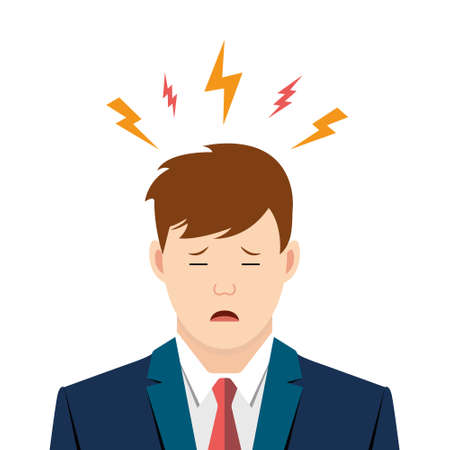1. The Entrepreneurial Hustle: Why Burnout Hits Founders Hard
Building a startup in America is often seen as an exciting adventure, but it comes with intense pressure and high expectations. Entrepreneurs are expected to wear multiple hats, work long hours, and constantly innovate to stay ahead of the competition. In the American startup culture, “hustle” is celebrated, and founders are often admired for their dedication and grit. But this relentless drive can come at a cost—burnout.
The Unique Stressors for American Entrepreneurs
Unlike traditional jobs, entrepreneurs face a unique set of stressors that make them particularly vulnerable to burnout. Here’s a look at some of the key pressures:
| Stress Factor | Description | Why It Matters |
|---|---|---|
| Unpredictable Income | Cash flow is often unstable in the early days of a business. | This creates constant financial anxiety and personal risk. |
| Wearing Many Hats | Founders juggle roles from marketing to accounting to product development. | Leads to overwhelming workloads and little time for rest. |
| Cultural Pressure to Succeed | The “American Dream” pushes founders to aim for rapid growth and big exits. | Failure feels personal and public, intensifying stress. |
| Lack of Work-Life Balance | The expectation is 24/7 availability, especially in tech hubs like Silicon Valley. | Personal relationships and health can suffer as a result. |
| Isolation | Entrepreneurs may not have a support network that understands their challenges. | This makes it harder to share struggles or ask for help. |
The Impact of Hustle Culture on Mental Health
In the U.S., stories of founders sleeping under their desks or working 80-hour weeks are common. While these stories can be motivating, they also set unrealistic standards. Many entrepreneurs feel guilty if they’re not always “on,” leading them to ignore signs of stress until it becomes overwhelming. This environment makes burnout more likely—and more dangerous—because taking breaks or asking for help may be seen as weakness.
Real-World Example: Startup Life in Silicon Valley
Take Silicon Valley as an example: the pressure to scale quickly and attract investors means founders often push themselves past healthy limits. Investors want results fast, so founders skip vacations, sacrifice sleep, and put their personal lives on hold—all while presenting an image of confidence and control. This combination of external expectations and internal drive sets the stage for burnout before most people even realize it’s happening.
2. Defining Burnout: What It Is and What It Isn’t
If you’re hustling in the U.S. startup scene, you’ve probably heard folks throw around the term “burnout” a lot. But what exactly is burnout, and how does it differ from just being stressed or tired? Let’s break down this concept so you can spot it before it sneaks up on you.
What Is Burnout?
Burnout is more than just feeling overwhelmed after a long week. According to the World Health Organization, burnout is a syndrome resulting from chronic workplace stress that hasn’t been managed successfully. For founders, this often means relentless pressure, high stakes, and never-ending to-do lists that leave you feeling emotionally drained, cynical about your work, and less effective than before.
Key Features of Burnout
- Emotional Exhaustion: Feeling drained, used up, or unable to recover even after taking breaks.
- Cynicism or Detachment: Developing a negative or detached attitude toward your startup, team, or customers.
- Reduced Performance: Struggling to get things done, missing deadlines, or feeling like nothing you do makes an impact.
What Burnout Isn’t
Burnout isn’t just having a tough day or pulling a late night to meet a deadline. In U.S. work culture—especially among entrepreneurs—stress and fatigue are almost badges of honor. But here’s where they differ:
| Standard Stress/Exhaustion | Burnout | |
|---|---|---|
| Duration | Short-term; comes and goes with workload | Long-lasting; persists even after rest |
| Mental State | Tired but still motivated; bounce back after downtime | Cynical, hopeless, detached from work and goals |
| Physical Symptoms | Tiredness relieved by sleep or time off | Chronic fatigue, sleep issues, physical complaints that don’t improve with rest |
| Work Impact | Still able to perform with some effort | Consistent drop in productivity and creativity |
| Social Impact | Irritability happens but passes quickly | Withdrawal from coworkers/friends, loss of interest in socializing |
The Startup Context: Why It Matters for Founders
The American entrepreneurial grind encourages pushing limits—think “rise and grind” or “sleep when you’re dead.” While hustle culture celebrates resilience, ignoring the signs of real burnout can cripple your business and well-being in the long run. Recognizing burnout early lets you take action before it impacts your company’s future.

3. Classic Signs and Symptoms of Burnout in Entrepreneurs
Burnout can sneak up on even the most passionate entrepreneurs, especially in the fast-paced American startup scene where “hustle culture” and the “grind” mentality are often worn as badges of honor. Understanding the classic signs and symptoms is key to catching burnout early and protecting your well-being.
Physical Red Flags
Entrepreneurs tend to push their bodies hard, sometimes ignoring warning signals. Here are some common physical symptoms:
| Physical Symptom | How It Shows Up | Often Misinterpreted As |
|---|---|---|
| Chronic fatigue | Feeling tired all day, even after a full night’s sleep | Lack of coffee, “just a busy week” |
| Headaches or muscle pain | Regular headaches, tense shoulders, back pain | Sitting at a desk too long, bad posture |
| Sleep issues | Trouble falling asleep or waking up often during the night | “My mind’s just racing with ideas” |
| Getting sick more often | Catching colds, infections, or feeling run-down frequently | Bad luck or seasonal change |
Emotional Warning Signs
The emotional toll of building a business is real. Watch for these signs:
- Irritability: Losing your temper over small things or snapping at coworkers and loved ones.
- Lack of motivation: Feeling like you’ve lost your drive, passion, or excitement for your work.
- Anxiety and worry: Persistent feelings of dread or being overwhelmed by daily tasks.
- Detachment: Feeling emotionally numb or disconnected from your business and team.
- Cynicism: Becoming increasingly negative or skeptical about your industry, partners, or customers.
Behavioral Changes to Notice
The pressure to always be “on” can make it hard to spot behavioral changes—especially when working long hours is normalized. Here are red flags to look out for:
- Withdrawal: Avoiding social events, networking opportunities, or spending less time with family and friends.
- Poor work performance: Missing deadlines, making mistakes, or procrastinating more than usual.
- Neglecting self-care: Skipping meals, exercise, or personal hygiene because you’re “too busy.”
- Overworking: Working extra-long hours not out of passion but because you feel guilty stopping—even when exhausted.
- Coping with substances: Relying on alcohol, caffeine, or other substances to manage stress and keep going.
The Role of Hustle Culture in Masking Burnout Symptoms
A big challenge for American entrepreneurs is that many burnout symptoms can be disguised as dedication. If you find yourself dismissing these red flags as “just part of the grind,” it may be time to pause and reassess. Recognizing these signs early can prevent bigger problems down the road and help you build a healthier relationship with your work.
4. Early Warning Signals Entrepreneurs Often Overlook
Subtle Cues That Go Unnoticed
In the fast-paced world of American entrepreneurship, early signs of burnout can sneak up on even the most driven founders. Because hustle culture and long hours are often celebrated, it’s easy to ignore or dismiss subtle changes. Recognizing these signals early is crucial to maintaining your well-being and business performance.
Changes in Habits
| Warning Sign | What It Looks Like |
|---|---|
| Skipping Breaks & Meals | You tell yourself you’re too busy for lunch or coffee breaks, making it a daily habit. |
| Working Late Nights (Regularly) | Your “just one more hour” turns into working past midnight several nights a week. |
| Neglecting Exercise | The gym bag stays untouched; walks or workouts get cut for more work time. |
| Poor Sleep Hygiene | Lying awake thinking about business problems, or using screens late into the night. |
Shifts in Mindset
Mindset changes are harder to spot but often show up as:
- Loss of Passion: Work that once excited you now feels like a chore.
- Shortened Patience: Little mistakes or delays make you unreasonably frustrated.
- Perfectionism Intensifies: You obsess over minor details, fearing any slip-up could tank your venture.
- Cynicism Creep: You start doubting partners’ motives or feel pessimistic about outcomes, even when things go well.
Impact on Interpersonal Relationships
Bonds with co-founders, employees, friends, and family often show strain before entrepreneurs realize they’re burning out. Watch for:
- Irritability: Snapping at team members or loved ones over small issues.
- Withdrawing Socially: Skipping team lunches, happy hours, or family dinners because “there’s just too much to do.”
- Lack of Empathy: Struggling to listen or offer support to others—your bandwidth feels maxed out.
- Avoiding Delegation: Micromanaging tasks you used to trust others with, convinced only you can “get it right.”
Spotting Patterns: A Quick Reference Table
| Area | Commonly Ignored Signal |
|---|---|
| Habits | No time for self-care routines, meals skipped, sleep sacrificed for work tasks. |
| Mindset | Persistent negative self-talk, increased anxiety about decisions, loss of creative spark. |
| Relationships | Diminished interest in connecting with others, frequent misunderstandings, feeling isolated. |
Why These Signals Get Missed in U.S. Startup Culture
The American entrepreneurial landscape rewards grit and relentless effort. Phrases like “sleep when you’re dead” and “grind now, shine later” are common. This makes it easy for entrepreneurs to misinterpret warning signals as just part of the process—until those small red flags turn into full-blown burnout. By tuning into these cues early, founders can take proactive steps to protect both their mental health and their company’s future success.
5. The Cost of Ignoring Burnout: Personal and Business Consequences
Burnout isn’t just a personal struggle—it can ripple out and impact your entire business. Many American entrepreneurs think powering through stress is part of the hustle, but ignoring the warning signs of burnout often leads to bigger problems down the line. Let’s look at how unchecked burnout affects both founders and their startups in real-world scenarios.
Personal Toll on Founders
When entrepreneurs ignore their own well-being, they may experience:
| Burnout Symptom | Everyday Impact | Example Scenario |
|---|---|---|
| Chronic Fatigue | Trouble getting out of bed, always feeling tired | A founder starts missing early meetings and falls behind on emails |
| Mood Swings & Irritability | Short fuse with colleagues or family | An entrepreneur snaps at a teammate during a product review |
| Lack of Focus | Forgetting tasks, making careless mistakes | The CEO overlooks an important contract deadline, costing the company money |
| Withdrawal & Isolation | Pulling away from the team and support network | The founder stops attending networking events or regular team check-ins |
Business Consequences for Startups
Unchecked burnout doesn’t just hurt the individual—it impacts the whole startup. Here’s how:
- Poor Decision-Making: When you’re running on empty, snap decisions can lead to costly mistakes, such as launching an untested feature or signing a risky partnership.
- Decreased Productivity: A burned-out leader sets the tone for the team. If you’re not performing at your best, neither will your employees.
- High Turnover: Team members notice when leadership is stressed or absent. This can make talented employees feel undervalued and leave for more stable environments.
- Cultural Decline: A once-positive workplace culture can quickly turn toxic if stress and exhaustion become the norm.
- Losing Investor Confidence: Investors in the U.S. often look for resilient founders. Signs of chronic burnout can scare them off, putting future funding rounds at risk.
American Business Scenario: The Domino Effect of Ignored Burnout
Imagine Lisa, a New York-based founder, who works 16-hour days to keep her SaaS startup afloat. She skips vacations and stops checking in with her co-founder. One day, she misses an important client call because she oversleeps. Her team starts worrying about job security, and her best developer quits for a better work-life balance elsewhere. Investors take note of the instability and put their support on hold. Within months, what began as personal exhaustion snowballs into lost revenue and shaken confidence in the business.
The Bottom Line: Early Intervention Matters
If you recognize these patterns early—both in yourself and your company—you can take steps to prevent lasting damage. Addressing burnout before it spirals protects not only your health but also your startup’s future growth and reputation.


